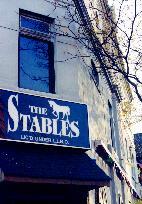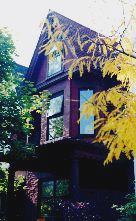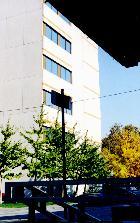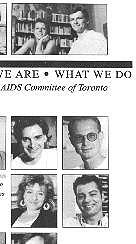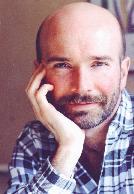|
Promiscuous Affections A Life in The Bar, 1969-2000
1987-1991:
|
|
Old Reliables
|
I wasn't much into C&W, but at the pool table found more pleasing attractions: Tom, so bad he was good; Ted, so good he was great.
What wonders to find, & all because I stayed long enough to look.
1991
January through May
The opening of Woody's had meant the demise of The Barn, not in fact (it exists to this day) but for me in spirit. With most of the staff I'd felt so good with now gone, it seemed no longer The Bar.
The new manager, a nice man named Mark, was for a while intent on making The Barn as nice as he was. Black paint went to shades of grey, the lights went up a notch, the dance floor was too often occupied not by gyrating boys but by some feeble spectacle: a "live sex show," all dildos of course; a butt shaving contest -- of already shaved butts, straight razors mere props.
Mark said he wanted to make it "less sleazy," making it fake sleazy instead.
In time the place would recover its historic appeal, would again be a place I could count on, even to sit quietly in a corner window with a view up Church Street, pondering the life around me.
But for the moment, at The Barn and most everywhere else -- and, I sensed, in some odd reaction to AIDS -- it was as if we needed to be entertained by something more than each others' presence. I'd said to Neil in that October 1990 letter:
-
I'll tell you what I miss most these days: The Bar -- that place that was basically always the same, that I could rely on. But no, not any more: they all have promo fever, reno fever; there's always some new thing, always parties and shows, they never just leave it alone. Everything is "something special," some borrowed veneer, some shallow extravaganza that never comes off, nothing is just itself.
For all the bars in this town I don't imagine there are many young gay boys here who have ever known The Bar, a place they knew as their own. They flock like lemmings from one to the next, entertained to boredom.
***
In fact I was wrong. Boys (and older men) were finding The Bar, if in surprising incarnations.
In December I'd gone to Chaps downstairs, once home to a piano but now doing country & western, and dubbed Badlands. I didn't much liked C&W but at Badlands that's what I got, with lines of men (and a few women) in cowboy boots and Stetsons stomping out the Texas Two Step on a raised wooden floor, tutored by the hugely popular (and gay) Dolbysound Cloggers.
It was oddly engaging but I doubt I'd have gone back but for other attractions, mostly at the pool table. I told Jane about them.
-
What turned it a month ago was a very big boy playing pool. He wasn't good at it (imagine me liking that!), but he was very good at saying he wasn't. Funny, unabashed and I do mean very big: 6 feet, 6 inches.
Even watching him be bad was good, and having him plunk down on the stool beside me and blab about it so easily was even better. His name is Tom. He teaches high school. He looks like he belongs in a suburban high school, too -- not as a teacher but as the sweet lummox on the football team. We've connected often enough there now that a meeting is a matter of big hugs and hellos.
The same night, later at the same pool table, I found Ted. Unlike Tom he is a very good player. I knew that just by watching, and I found out what an acute eye I have a week later, when he suggested I come see him play at The 457.
It turned out to be the awards night for the Pool Bar League. Ted won Rookie of the Year. Ted won Number Two Player in the league. And at the end of the night Ted won the round robin shoot off that had been going on all evening.
Through all this he'd been dividing his attentions between a crowd of teammates and me. Before the shootout was over they had left for another bar; I was left with him to cart all those trophies there trying to catch last call, the two of us hustling through the streets at 1 am laden with plastic glitz and Ted beaming. "I've got to give these to my mother."
Well! Imagine the body of a swimmer, the laugh of a kid who likes his mother and his friends and who likes being liked, the manners of someone who, while playing, will give advice on shots to his opponent ("it makes the game better -- and besides, if they get the shot it means I give good advice!"). He's gloriously sexy. I got a kiss goodnight that night. I don't seriously expect to get one again. But I know where to find him. And Tom.
What wonders to find, and all because I stayed long enough to look.
***
It was in December too that I'd begun spending more time with Michael Lynch. He was unwell enough by September that Ed Jackson, Gerald Hannon, Alan Miller and others had started doing rotating shifts to be with him at home.
He was well enough by late October to attend a gay conference in Boston with Eddie, a boost for them both, familiar hands there and many bright young things too. One asked Eddie, quite grey by now, if he'd been involved in the Mattachine Society in the '50s. (Ah well, what's 20 years?)
By December, though, Michael needed more help. His son Stefan had come back from California, not believing Michael when he said it wasn't necessary. Ed was arranging shifts to cover 24 hours a day. He hadn't asked me, I suspect imagining it was too soon after Michael Wade's death. But I signed on, doing mostly Thursday mornings.
Many others had as well; in time there were more than 30 of us, getting advice from Yvette Perreault, head of AIDSupport at ACT, and Andrew Johnson, a nurse who worked on Anita Rachlis's AIDS ward at Sunnybrook, also an ACT volunteer. (Andrew would later become director of AIDS Vancouver.)
In a January meeting with Yvette and Andrew at Roger Spalding's place, we had formed a core group to coordinate the care team. My particular role was to pull together a manual to guide them.
"It's well underway," I told Jane, "a fat blue binder with lots of sections: a list of the team with phone numbers; a shift schedule; guidelines on food, medical care, cooking, cleaning up, what to do in emergencies. Imagine a manual for how to run your life if you couldn't: where everything is, using the appliances, what you like and don't like to eat -- all the things you take for granted and never imagine having to write down.
"Well, as you can tell I've taken refuge in the practicalities again."
***
But of course it was more than practicalities. It was Michael Lynch: movement patriarch, founder of everything from Gay Fathers of Toronto to ACT to AIDS Action Now!, on top of his career as a poet and academic -- and whatever state he might now be in on any given day.
On my first Thursday he was in bed, alternating fevers and rattling chills. But the next week he was better; we talked about a book he wanted to finish, on sodomy in 19th century New York. Michael would go up and down like this for some time.
He was on a slew of drugs, most now for mycobacterium avium intercellularae, MAI, an infection similar to tuberculosis. By the middle of January he had asked his doctor how long he might last if he stopped those MAI drugs. She said a few months.
Michael stopped them, told us not to push food on him; got ready to die. He called in casual friends for the final visitation. In a training session Andrew Johnson told us what to expect, what death might look like.
We were to let it happen. For a bad cut, a fall, a fracture, we were to call his doctor, never an ambulance. Its attendants would be obliged to try resuscitating him if he were dying, then whisk him off to hospital.
Michael insisted that not happen: he wanted to die at home.
***
The American Disneyland vision: them; not me, not anybody like me.
Well why the hell not?
It was a hard insistence, more so on the care team (we'd come to call it the Lynch Mob) even than on Michael himself.
In mid February Yvette led us through some care of the dying stuff, to which one member of the team, Stephen Manning's lover Jeff Braff, kept heaving huge sighs. As I told Jane:
-
There were two main points, Yvette said: we had to like the person, and we had to accept that death was a natural part of life. Jeff would have none of the latter point. "Maybe death's natural for someone who's 85, but not for somebody who's 45."
He raged and raged, would not let go of it -- and finally I was so tired of his rage. Of course we've been hated, ignored, allowed to die. Of course we should be angry. But finally that's the fight of those who will go on living to fight.
In death we're past it, past caring about it. All the transitory shit politics finally fall away and must: something much larger is there to be dealt with and, I think, must be dealt with in peace.
I said that to Jeff, tough as it is to challenge anybody's emotional reactions in these things. "I understand your rage, Jeff. I share it. But there's a point beyond which it won't be of any use to Michael. There's a point when he will need you to let him go." Chastened big bear, he agreed.
But more than that I agreed with Alan Miller, who's still reliving Gram Campbell's death in all this and who nodded assent to all the stuff about accepting death as natural. I suspect that the more one's seen of it the more one knows it's true. Later I said to him: My god, what hubris to think people don't die at 45. Or younger.
Of course they do. They always have. We've simply been privileged not to know or have to know. And, frankly, a piece of me rages too at that blind hubris, that blinkered privileged American Disneyland vision: them, not me, not anybody like me. Well why the hell not?
My usual response to easy moral outrage, I guess: I want to ask, Didn't you know? Where have you been?
In February posters went up around Church and Wellesley with the slogans "No More Shit!," "Enough is enough!" and "Our Stonewall." They were put up by Queer Nation, many members too young to recall what they commemorated: the February 5, 1981 bath raids.
Gerald held a party to mark the anniversary. Dennis Findlay made a cake: a room at the Roman Sauna complete with towel, lube and (anachronistically, Gerald noted) a condom -- all edible.
Brent Hawkes, pastor of MCC, asked me there: How is Michael Lynch? I said he would likely die within the month. He did not, and would not for some time.
***
|
Care & treatment treks
|
Once with David at the Pentamidine clinic, I saw Mike Robért. I introduced them; David loved his voice -- that gorgeous boy sweet audible smile.
If I could undo all this for anyone, it would be handsome messy space cadet Mike.
Every two weeks, after Michael on Thursday mornings, I was with David Newcome, guiding him on the short walk from South Drive to The Rosedale Medical Centre.
It was at 600 Sherbourne just across Selby Street from Boots -- so south of Rosedale proper. But the name carried chachet. There on the 8th floor was the Chest Clinic, that name too carefully chosen. Its purpose was more specific: to dispense Pentamidine.
The clinic had been set up by three doctors who'd had to fight to get it funded, but it was greeted with skepticism by some AIDS activists. One wrote about it in Xtra, not giving its address or hours, hinting that other doctors would no longer be able to offer Pentamidine free in their own offices, and that it was really just cover for yet another research trial.
The research angle was true: the clinic did do regular pulmonary tests to monitor possible side effects. The drug was free there, and still elsewhere too. I had no reason to mistrust the motives of the doctors who'd set it up: one of them was Anita Rachlis, another Philip Berger.
I had started Pentamidine just after the clinic opened in 1989. It was a boring routine: suck a deep breath of the stuff from a little nebulizer, hold it for 12 seconds, let it out, do it again, keep doing it for half an hour. I didn't much mind, got used to the taste, liked the quiet and the view far out over the Don Valley.
Michael Lynch had been taking David until he got too weak, so I took over, happily enough. But my routine wasn't any longer so peaceful.
- Friday, February 15, 1991, to Jane:
David is still fine, of course, so fine that he probably doesn't know how much emotional space he takes up. Being his sighted guide isn't hard -- but trying to keep up with his relentless conversation and be his eyes at the same time can be.
Nothing stops him. Not someone barrelling at us without looking; not an elevator full of people I have to get through to push our floor button. Seeing none of it he goes on and on -- and I have to try both to pay civil attention and get us where we're going without getting killed.
While we were puffing away yesterday, David giving details of his CNIB / TTC work to staff there who hadn't read the article I've enclosed, I saw reflected in the window behind him a tall figure moving down the hallway to another treatment room: Mike Robért. It's the first time he's been there at the same time -- despite saying often that he'd try to be. I went to say hello. He was tired. The abdominal abscess is quiet but it's not gone.
I introduced him to David and we all rode down the elevator together. David loved his voice. I knew he would: gamin, breaking, that gorgeous boy sweet audible smile. He is still so damn fucking beautiful. Damn damn damn. If there were anybody I could undo all this for -- as if I could -- it would be handsome messy space cadet Mike. In 20 minutes I fell in love with him all over again.
***
That article I'd sent Jane was from The Toronto Star, a big piece on David and his work with the Canadian National Institute for the Blind and the Toronto Transit Commission to make the subway safer for visually impaired people.
David had started writing letters about it in June 1990, after a blind woman had lost her bearings at a station, fallen, and been killed by a train. He was helping develop tiles for the edges of platforms, bright yellow for those with low vision, covered in bumps that, when run across with a cane, made a distinctive clatter.
He also worked with city engineers on sidewalk wheelchair ramps -- "curb cuts" they're called, potentially dangerous to the blind who need to know where curbs are -- similarly textured so they too could be found with a cane.
"What a conundrum David is for me," I told Jane.
-
Relentless goodness (as that article attests) exercised in the world through an equally relentless monomania. He is always, always right. It can be so exasperating -- much as I know him well enough to let it roll off me in silence, or even, when I risk it, in gentle ribbing. Yet I know it's his very blinkeredness that has given him strength to survive being blind.
I know too that his insistent self assertion is more a matter of role than self reflection. He does reflect; he just doesn't do it out loud. Paul's been hinting for months that they need to move. His agenda has two parts. The cover: he needs more space for work, for seeing clients. [Paul had gone into private consulting some time before, doing very well with it.] The truth: he needs to know that when David is as sick as Michael they must have a bedroom for David alone and another for Paul, perhaps even for other care givers.
David has resisted: why learn sightless negotiation of another space? But more to the point -- why give in to that second agenda item? Michael's state has got under both their skins, made them crabby with each other.
Yet in the end David has given in. They'll move in June.
***

Another space to suss out: Paul & David's new more spacious place, at 171 Roxborough St E. |
I had dinner at Paul & David's nearly every Saturday. David set the conversational agenda, soon declaring one subject verboten: the AIDS Committee of Toronto.
It was mostly funny -- but I had almost nothing else to talk about. Like The Body Politic, ACT had become my life.
I helped Paul on that move, to another house in Rosedale, still a second floor but much bigger. It had been designed in 1902 by architect J Wilson Siddall as his own house, another of his works quite familiar to David and Paul: the vast, arch roofed south St Lawrence Market.
There was a big bedroom and two smaller ones; Paul's office went into one, the other became a sitting room with a pullout sofa bed. The living and dining rooms were so big we had a hard time arranging things: furniture had to be in close proximity so David could feel his way from one piece to another.
The dining room looked to have once been a sun porch, wrapped in big bright windows. The kitchen was right by it, making easier one of David's firm routines: clearing the table after dinner and washing the dishes alone in the kitchen, and in the dark.
David wasn't around for that move. He was in hospital after a sudden nosebleed that wouldn't stop even there, both he and Paul covered in blood -- about a third of all David had -- before it was over. It had been a bad scare, but both got through it.
Part of the move, as twice before, was taking apart and later reconnecting the hugely complex audio and video system David had built on his own, in a cabinet he'd also built, a mass of cables linking a dozen components. I was smart enough this time to label everything before taking it apart. Still, when we turned it on at the new place it didn't all work: no sound on the TV.
I called David at Sunnybrook. He asked: "Is the TV on channel 3?" It wasn't. And of course once it was it worked. David loved that: without him we still couldn't quite figure things out.
***
I had dinner at Paul and David's, often with others, nearly every Saturday at 7 pm. David still set the conversational agenda, in time declaring a particular subject verboten: the AIDS Committee of Toronto.
Just as well, I suppose: Paul had been elected to ACT's board of directors in October 1990 and the two of us might well have gone on and on about it if not stopped. David stopped us firmly, to the point of greeting me at the door with: "No talk about ACT!"
It was mostly funny -- but I had almost nothing else to talk about. Like The Body Politic before, ACT had become my life.
It was not quite the life I'd known at TBP. It was still political if often less clearly so, the connections between politics and direct care, though real, often vague; still a place full of gay people if not limited to working with other gay people; and, much more so than at the paper, with lots of those people lesbians.
Women involved with TBP had always been a minority, both there and beyond, many women still skeptical of working with men. The lesbians at ACT had been vocally among those skeptics. They brought with them feminist politics familiar to most of the men -- but also feminist practices new to many.
Half of each weekly staff meeting was devoted to "check in," a go round meant to let others know how one was feeling. It could get quite heavy. The women were good listeners, men more inclined to rush in and try fixing things. Theresa Dobko, ACT's first counsellor, could respond with a distinct and too familiar disdain: the boys will never get it.
***
I did get it in principle, but could resent the practical effects of all this "self care." The staff was once off to a workshop on racism, surely a good thing but it closed the office for the day.
It was also closed on weekends. I knew why -- resources were limited -- but hated it nonetheless. Working there one Saturday I went out to sit in the long stairwell. A man passed me, ignored me when I said the place was closed, rattled both doors at the top of the stairs, came back down, said "My lover is dying" -- and walked out.
Another time on those steps I saw a man carried down by one person, his wheelchair by another. A reception volunteer came down after him and told me: "He wanted to see a counsellor but I couldn't find one. I called them all. No one was available."
I had been sitting with a counsellor in his office, just for a chat, and witnessed him taking one of those calls. "No," he said, "I'm tied up right now."
***
|
Boys & girls of ACT
|
"What a way we've come: tight-assed gay radicals talk about their feelings at feminist inspired check-ins & help lesbians have babies; anti-violence activists sing with S/M dykes & defend the role of drag in gay history."
-- to Jane, May 1991,
on the politics of men & women
at ACT.
Everyone saw these problems, particularly "receptionists" (a term I hated; later they would see, and say, they were "user advocates," not staff's lackeys), but also Yvette Perreault.
She was the second counsellor hired and could be a firestorm. But she was also inclined to listen to her passionate self, go home, think about it and then the next day find me and say, "Come talk to me," so she could share what she'd pondered.
I got on all right with Theresa, if never losing some wariness of her: she wore the uniform of a classic late '70s lesbian feminist, often an intimidating lot. I came to adore Yvette, glam with big earrings, big hair, likely relieved that the early '80s Sex Wars had redeemed butch / fem traditions.
Ed Jackson later said that what he valued most about ACT was having a chance to work with these women, with their resistance and power. Yvette had been one of the signatories of those angry Red Hot / Race & Moustaches letters in TBP in 1983. Now we had a chance to really figure each other out.
In an April check in Yvette announced she was pregnant, by artificial insemination. That wasn't a big surprise, but the identity of the donor was: Ed Jackson. "Just what we need," Stephen Manning exclaimed, "a dynasty!"
***
That dynasty never came to be: Yvette lost that baby and a second too, Ed also the father that time. But their relationship helped break down the walls of ACT's solitudes: the girls in direct care; the boys in education and administrivia.
So did the gradual breakdown in those gender distinctions, with a few men hired in AIDSupport, former counsellor Lesli Gaynor taking on a job in Education coordinating the Women and AIDS Project, and Ruthann Tucker hired as executive assistant.
Even among women, these working relationships had no little political irony.
- May 1, 1991, to Jane:
Last night was a fundraiser for ACT's Women & AIDS Project and Ward's Retreat, a show at Chaps called "Queen for a Day." Yes, another drag show -- but the drag queens were all lesbians.
They were not in drag as men, but as women. No -- as drag queens, quite a different thing altogether. All were "made over" by some of the city's best known drag performers, who for a change were dressed as men. Only gay people could understand men in pants and women in dresses as gender bending of a most sophisticated kind.
Ruthann Tucker went from big bad Ruthann (blowing smoke in the MC's face -- and Ruthann doesn't smoke) to something like Craig Russell doing Peggy Lee, running around the stage in a blonde wig and flowing crepe throwing two handed kisses to the crowd.
She said today she loved it, but couldn't imagine wanting on a regular basis to spend two hours of torturous preparation to end up looking like that.
These were not just any butch dykes. There was Ellen Agger, once of the Lesbian Mothers' Defense Fund [which even other feminists mistrusted], done up in a long gold gown, calling herself "Sunday Brunch." Debbie Parent, looking as wicked as Carole Pope at her most perverse, has been at the Rape Crisis Centre for years.
Ruthann, with a long career on the dyke S/M side of the Sex Wars, might never in years past even have imagined being in the same bar as these women, let alone with them in dresses lip synching their hearts out. They ended with "We Are Family." The crowd went wild.
There were rumours that some women planned to picket the event. We got a letter at ACT deploring our involvement (she said she didn't need men to tell her how to be a woman -- which I think quite missed the point). The Women's Caucus met to draft a response.
I popped in long enough to leave a photocopy of Neil Bartlett's 1985 article "Man in Frock" ("Confusion can be a very valuable tool, because when people are confused they are sometimes obliged to think") -- and to hear one line from Yvette: "We have to remind people who drag queens are. They've been on the front lines for us for hundreds of years."
What a way we've come: tight assed gay radicals happily talk about their feelings at feminist inspired check ins, snuggle to keep warm a sick friend they'd never have touched before, help lesbians have babies; anti violence activists sing with S/M dykes, hug men who have tortured them into makeup and spike heels, and defend the role of drag in gay history.
***
|
Testing identity
|
Identity politics, if often useful, was at heart the politics of victims. Everything was someone else's fault. Only "they" could fix it. They have the power. We have none.
It could feel true. But it was always a lie.
Behind this unity of men and women a new division was growing. At ACT's founding it had two clear roles: caring for the sick and dying; and working to keep everyone else uninfected.
But now most of the people coming to ACT were infected but were not sick, dying, or even infirm.
We'd seen this change in the late '80s, after HIV testing was widely available along with counselling about results, those results more firmly confidential, and treatments like AZT at last an option where before there had been none. With all that it was a good idea to know if you had HIV: you could do something about it.
ACT had said so in early 1990, changing its tune from "Don't take the test" to "It's time to think about it." Even before that many people did get tested, and with that a new category emerged: People Living With HIV.
AIDS had always been rife with acronyms, beginning with AIDS itself. Before discovery of the virus there were PWAs (People With AIDS), PLWAs (Living With it), people with ARC (AIDS Related Complex, symptoms just short of AIDS) or with PLS (Persistent Lymphadenopathy Syndrome, one symptom).
Now there were PLWHIVs, PLWHIV / AIDSs, and in time their conflation: PHAs.
Each acronym was fought over, each one newly "correct" -- because each was a mark not of infection or the state of one's health, but of one's identity. It was the Age of Identity Politics.
One can have more than one identity. Our choosing one as primary -- gay, woman, Black, Deaf -- could have remarkable effects, building strength personally and collectively.
But it could also reduce unique, individual human experience to a single category and, too often, reduce one's politics solely to the concerns of that category.
An identity chosen in conscious resistance to oppression could too easily define everyone outside that category as the oppressor. At The Body Politic we'd had a joke about this: a device dubbed "the oppressometer." The more units of oppression you had the more holy your cause, the more points you could score on others less victimized.
For all its potentially valuable uses, identity politics was at heart the politics of self victimization. Everything was someone else's fault. Only "they" (however defined) could fix it. They have the power. We have none.
That could feel true, but it was always a lie.
***
Identity politics were a natural refuge for people with HIV. Even as we insisted we were not "victims" we could play off our victimhood, claiming it as a special kind of sanctity not possessed by the uninfected.
Sanctity it was not -- but it could confer a kind of knowledge that others did not possess in quite the same way. People with HIV could rightly claim that AIDS organizations needed that knowledge if they were not to become, in Cindy Patton's phrase, a collection of mutually exclusive "experts, victims, and volunteers."
At ACT we had always said there is no "us" and "them," no "helpers" and no "helped." We were all in this together, working with and for each other. But it wasn't always easy.
In 1989 a group of staff at ACT had started an HIV Caucus. It had less to do with support (plenty of that on offer elsewhere) than with the place and power of people with HIV within ACT itself. Almost all were on those temporary, unrenewable get 'em off welfare contracts -- even when their work was vital.
In early 1991 the Caucus did a memo to the board, about to go for another round of those contracts, warning of the practical pitfalls of funding essential services with short term money -- and the political quicksand of staffing them with a procession of people, new every year, clearly disadvantaged, most with HIV.
In an organization dedicated to fighting AIDS, the people facing AIDS in their own bodies were second class citizens.
We pointed out that identity of any kind -- serostatus, race, gender -- could be relevant in particular jobs, working with particular communities. This idea was widely (if informally) accepted. Nonetheless, it came to quite a mess in some hirings.
***
But if they expected me to give up on friends not yet sanctified by an accidental virus, then I'd put my foot in the right place.
The Canadian AIDS Society also had an HIV Caucus, one feeling a bit defensive: other people with HIV were trying to start a national organization of their own, to stand back and make demands from the outside on "AIDS service organizations," as they came to be called.
I had my first encounter with that caucus when I went to the CAS annual conference in Ottawa in May. With a friend I wandered into a dinner going on between discussion of a resolution and the vote on it: that the Canadian AIDS Society's main priority be not prevention of HIV infection but treatment issues, always the big concern for people with HIV.
When the vote came it was all in favour with one abstention: me. I abstained only because I'd missed the discussion. Even at that I thought: Well, I guess I've put my foot in it with this gang.
But if they were asking me to give up on an entire community affected by AIDS, facing it head on even if not yet sanctified by an accidental virus, then I'd put my foot in the right place.
I was on a panel of people with HIV, addressing all 200 delegates. I talked about why I chose to work at ACT, with some people HIV positive and many more not. I noted that I had been a gay activist before I was an AIDS activist, and an AIDS activist before I was (or knew I was) a Person With HIV.
***
"History tells," I said. "I am trying to preserve the life, the lives, and the best, most hard won values of the community I come from" -- and which I was not about to abandon.
I got a standing ovation. But that applause hardly concluded the battles of HIV Identity Politics.
Go on to 1991: Jun-Dec / Go back to Contents
This page: http://www.rbebout.com/bar/1991a.htm
December 1999 / Last revised: October 7, 2001
Rick Bébout © 2001 / rick@rbebout.com
